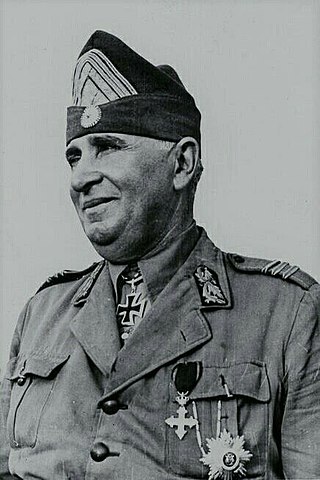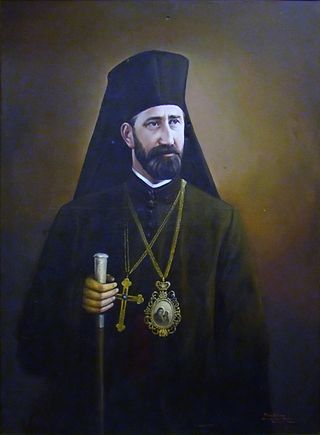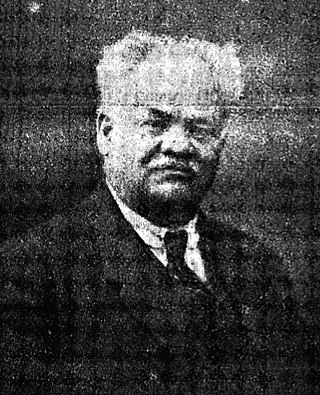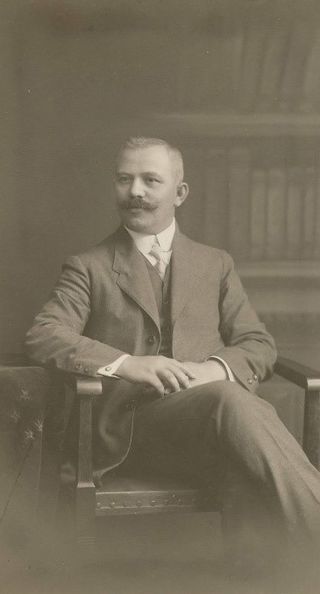| |||||
| Decades: | |||||
|---|---|---|---|---|---|
| See also: | |||||
Events from the year 1942 in Romania. The year was dominated by the Second World War.
| |||||
| Decades: | |||||
|---|---|---|---|---|---|
| See also: | |||||
Events from the year 1942 in Romania. The year was dominated by the Second World War.
Romanian literature is the entirety of literature written by Romanian authors, although the term may also be used to refer to all literature written in the Romanian language or by any authors native to Romania.

The Saint Sava National College, Bucharest, named after Sabbas the Sanctified, is the oldest and one of the most prestigious high schools in Romania. It was founded in 1694, under the name of the Royal Academy of Bucharest.

Alexandru "Alecu" Șerbănescu was a leading Romanian fighter pilot and flying ace in World War II. At the end of Romania's campaign on the side of the Axis, Șerbănescu was the country's leading ace, dying only 5 days before the country changed sides. He was credited with 47 aircraft confirmed destroyed and 8 probables.
Selma Meerbaum-Eisinger was a Romanian-born German-language poet. A Jew, she was murdered in the Holocaust at the age of 18 in a labor camp in Ukraine.

Corneliu Dragalina was a Romanian lieutenant general during World War II.

Ioan Dumitrache was a Romanian major general during World War II, in command of the 2nd Mountain Division. His troops were recognized as the elite troops of the Romanian Army throughout the campaign on the Eastern Front. He was a recipient of the Knight's Cross of the Iron Cross of Nazi Germany, awarded to him for capturing Nalchik on November 2, 1942.

Andrei Mocioni de Foen was an Austrian and Hungarian jurist, politician, and informal leader of the ethnic Romanian community, one of the founding members of the Romanian Academy. Of a mixed Aromanian and Albanian background, raised as a Greek Orthodox, he belonged to the Mocioni family, which had been elevated to Hungarian nobility. He was brought up at his family estate in the Banat, at Foeni, where he joined the administrative apparatus, and identified as a Romanian since at least the 1830s. He rose to prominence during the Hungarian Revolution of 1848: he was a supporter of the House of Lorraine, trying to obtain increased autonomy for Banat Romanians in exchange for loyalism. The Austrians appointed Mocioni to an executive position over that region, but curbed his expectations by including the Banat as a whole into the Voivodeship of Serbia. This disappointment pushed Mocioni to renounce politics during much of the 1850s.

George Barbu Știrbei or Știrbeiŭ, also known as Gheorghe, Georgie, or Iorgu Știrbei, was a Wallachian-born Romanian aristocrat and politician who served as the Minister of Foreign Affairs from July 15, 1866, until February 21, 1867. He was the eldest son of Barbu Dimitrie Știrbei, Prince of Wallachia, and the nephew of his rival, Gheorghe Bibescu; his younger siblings included the landowner and industrialist Alexandru B. Știrbei. Educated in France, he returned to Wallachia during his father's princely mandate, as a Beizadea and aspiring politician. Fleeing his country during the Crimean War, he served the French Empire before returning home to become Wallachian Minister of War and Spatharios. He is remembered for reforming the Wallachian militia during the remainder of Prince Barbu's term.

Nicolae Colan was an Austro-Hungarian-born Romanian cleric, a metropolitan bishop of the Romanian Orthodox Church. From a peasant background, Colan completed high school in Brașov, followed by a period of wandering during World War I that saw him in Sibiu, Bucharest, Moldavia, Ukraine and ultimately Bessarabia, where he advocated union with Romania. After the war, he completed university and taught New Testament theology at Sibiu from 1924 to 1936. Entering the clergy in 1934, he soon became bishop at Cluj, remaining there when Northern Transylvania temporarily became Hungarian territory during World War II. In 1957, he advanced to Metropolitan of Transylvania, an office he held for the final decade of his life.

Gheorghe Bogdan-Duică was an Imperial Austrian-born Romanian literary critic. The son of a poor merchant family from Brașov, he attended several universities before launching a career as a critic, first in his native town and then in Czernowitz. Eventually settling in Bucharest, capital of the Romanian Old Kingdom, he managed to earn a university degree before teaching at a succession of high schools. Meanwhile, he continued publishing literary studies as well as intensifying an ardently nationalistic, Pan-Romanian activism. He urged the Romanian government to drop its neutrality policy and enter World War I; once this took place and his adopted home came under German occupation, he found himself arrested and deported to Bulgaria. After the war's conclusion and the union of Transylvania with Romania, he became a literature professor at the newly founded Cluj University. There, he served as rector in the late 1920s, but found himself increasingly out of touch with modern trends in literature.
Enea Hodoș was an Imperial Austrian-born Romanian prose writer and folklorist.

Alexandru Rosetti was a Romanian linguist, editor, and memoirist.

Ion Lapedatu was finance minister of Romania (1926–1927), Governor of the National Bank of Romania (1944–1945), and honorary member of the Romanian Academy.

Alexandru I. Lapedatu was Cults and Arts and State minister of Romania, President of the Senate of Romania, member of the Romanian Academy, its president and general secretary.
Events from the year 1944 in Romania. The year was dominated by the Second World War. The year started with the Soviet Army assault on Romanian troops and the Battle of Romania. King Michael led a coup d'état during the year and Romania left the Axis powers and joined the Allies. The Romanian army subsequently won victories against German and Hungarian troops.
Events from the year 1947 in Romania. The year saw the abdication of Michael I of Romania and foundation of the Romanian People's Republic.

Events from the year 1950 in Romania. The year saw Romania build relationships with other Communist states, including China and East Germany.
Events from the year 1924 in Romania. The year saw the first time that the country competed as a team in the Summer Olympic Games, and, although the country won no medals, Romania went on to enter every subsequent game apart from 1932 Summer Olympics.
Events from the year 1922 in Romania. The year saw the Dealul Spirii Trial and the crowning of King Ferdinand.
Events from the year 1920 in Romania. The year was marked by the signing of the Treaty of Trianon and Treaty of Paris, and a general strike.